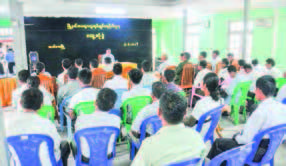Deputy Minister for Agriculture, Livestock and Irrigation Dr Aung Gyi met with entrepreneurs, farmers and potential investors in the livestock industry who operate businesses with the State economic promotion fund on 6 April at the meeting room of the General Administration Department of Lewe Township, Nay Pyi Taw.
The deputy minister stressed the formulation of a robust market for micro, small, and medium-sized enterprises. He also mentioned ongoing livestock industry development projects funded by the State economic promotion fund aimed at producing quality products. Livestock breeding villages are being established in states and regions, including Nay Pyi Taw, to develop the livestock industry and increase the production of nutritious meats.
Additionally, the Livestock Breeding and Veterinary Department and the Myanmar Livestock Federation are overseeing, monitoring and reviewing processes to ensure a convenient supply chain and provide necessary support to farmers for optimal benefits.
The regional official for livestock industry development explained the progress of livestock projects implemented with the State economic promotion fund within Lewe Township, Nay Pyi Taw and the director-general and officials from the Fisheries Department and the Livestock Breeding and Veterinary Department discussed potential assistance of the departments. Farmers who attended the meeting proposed and presented difficulties and requirements encountered in the operations to the deputy minister.
Deputy Minister Dr Aung Gyi and officials then observed a farmhouse in Kanzunkhin Village in Lewe where 5,000 CP broilers are raised and a farmhouse which farms 6,000 CP broilers and pigs with State economic promotion fund in Rathedaung Village in Lewe.
The deputy minister addressed prioritizing biosafety, increasing incomes from two sectors by conducting multisector agriculture and livestock systems, producing animal feedstuffs from agricultural produce, producing fertilizers from animal waste, and urging the recycling system to be applied efficiently. He also called on collaboration between departments and private sectors since the development of the meat manufacturing industry depends on the private sector's development to ensure the production of livestock products for domestic sufficiency. — MNA/ TMT



